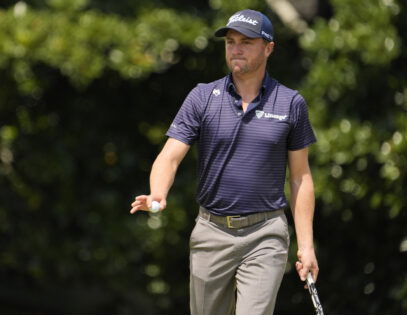“I think it’s just impossible to answer, isn’t it.” Wait, what? Those words from Matt Fitzpatrick during the Open Championship weren’t about some impossible pin position or howling wind conditions. Instead, they revealed something that should alarm every golf fan. The sport’s most vocal pace-of-play critics just threw in the towel and admitted they have no clue how to fix this mess.
During his press conference at Royal Portrush, the question came directly: How would you fix the pace? Fitzpatrick paused. Then he delivered his honest assessment. “There’s so many different parts to it,” the major champion continued. “I think players probably speeding up a little bit probably will help the situation, but yeah.” His voice trailed off. The answer felt incomplete because it was.
This admission echoed comments Justin Thomas made months earlier. Thomas spoke after his TGL debut in January. The league’s 40-second shot clock kept things moving smoothly. Fans immediately wondered if the PGA Tour could adopt similar measures. However, Thomas quickly dampened those hopes.
May 15, 2024; Louisville, Kentucky, USA; Justin Thomas pitches onto the green of hole 12 during a practice round for the PGA Championship golf tournament at Valhalla Golf Club. Mandatory Credit: Clare Grant-USA TODAY Sports
“You have to make such drastic changes for it to be noticeable,” Thomas explained to reporters. He’s spent a decade on the Player Advisory Council discussing this exact issue. “Pretty much a lot of the conversations end the same way; it’s like, what are we trying to accomplish here?” Thomas continued his frank assessment. “Are rounds going to be 12 minutes faster? Are they going to be 20 minutes faster?”
Furthermore, Thomas highlighted the fundamental contradiction facing the game of golf. “They like harder golf courses, they like watching us play difficult places but they want us to play faster, so those two don’t go together.” Fans demand both tougher setups and quicker rounds. The math simply doesn’t work. Tour officials can’t deliver both simultaneously.
Consequently, these admissions carry extra weight because of who delivered them. Thomas serves as a PAC veteran who’s discussed the pace of play “all 10 years” of his tour career. Similarly, Fitzpatrick built his reputation as a fast player and vocal critic. He’s consistently called out slow competitors. Moreover, he has criticized tour officials for their inaction.
Yet both players now essentially throw up their hands. Thomas questions whether meaningful improvement is even possible. Fitzpatrick admits the problem defies simple solutions. Their combined experience spans decades of professional golf. Still, they offer no concrete answers.
The irony deepened recently when Fitzpatrick took over two minutes to complete a single stroke during the Genesis Scottish Open. Fans timed him at 2 minutes and 22 seconds on the 17th hole. The same player who called slow play “truly appalling” became the problem he criticized. Suddenly, the fast player found himself in the spotlight for all the wrong reasons.
PGA Tour’s Leadership Vacuum
This pattern reveals a troubling leadership void in professional golf. The sport’s most knowledgeable insiders acknowledge the problem. However, they provide no roadmap for the future. PAC members discuss the pace of play endlessly during meetings. Nevertheless, they admit these conversations lead nowhere productive.
Recent PGA Tour initiatives feel more like window dressing than solutions. Officials tested rangefinders at select events. They reduced field sizes for 2026. Additionally, they established a “Speed of Play Working Group” and committed to publishing statistics. Despite these efforts, the fundamental issue persists unchanged.
Meanwhile, amateur golfers consistently finish rounds faster than professionals. Weekend players navigate courses in 4.5 hours. This includes drink breaks and ball searches. Conversely, tour players regularly exceed five hours despite optimal conditions. They have yardage books, caddies, and meticulously maintained courses.
Both Thomas and Fitzpatrick understand this disconnect completely. They also recognize fan frustration with endless delays. Television broadcasts suffer when groups fall behind schedule. Ticket-holders grow restless watching players deliberate over routine shots.
Yet their honest admissions reveal the harsh truth. Golf’s leadership simply doesn’t know how to fix what everyone agrees is broken. The most qualified voices have essentially given up.
The post Justin Thomas Admitted Growing PGA Tour Problem Is Too Hard to Fix & U.S. Open Champ Agrees appeared first on EssentiallySports.
